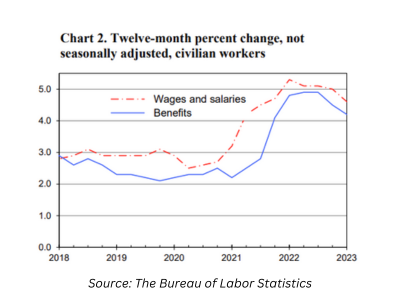Trends Following The Great Resignation
In the last few years, saying the economic landscape has “undergone a remarkable transformation” is certainly an understatement.
Though we're now years out of initial disruption, annual wages continue to defy expectations. Meanwhile, a contrasting phenomenon is taking root—employees are choosing to stay put in their current roles.
Here’s a more in-depth look at emerging labor trends going into 2024:
Wages are Still High
From inflation to The Great Resignation, there’s been a pandemic-driven surge in salaries across industries.
In 2013 to 2019, the years predating the shift, average wages never saw beyond a 3% climb. The pandemic called upon employers to push up this number. They either offered more competitive pay or lost their workforce.
Three years out from this dramatic hike, we’re still seeing annual wages soar beyond their pre-pandemic years. According to the Bureau of Labor Statistics annual report, wages increased 5.3 percent from June of 2021 to June of 2022. This only fell slightly during the following period of 2022 to 2023, when wages rose 4.6 percent.
2023’s salaries came as a shock to many employers, whose 4.4 percent-average budgets turned out to be lower than their actual costs.
While job opening rates are slowly matching unemployment rates, employers learned they needed to continue offering significant salary increases to stay competitive. Consequently, next year’s budgets are expected to remain high.
The most recent World at Work survey showed that organizations are planning for 4.1% pay increases for 2024-- That's still quite above pre-pandemic levels and not far from last year's rise.
The bottom line: wage growth is not cooling off nearly as fast as many economists had expected. While some industries are more immune than others, employers shouldn’t plan to scale back too much when budgeting for salaries.
Resigners are Remorseful
As wages continue their upward trajectory, another notable trend emerges on the employment landscape—employees are increasingly opting to stay put in their current positions. While the allure of higher pay has been a driving force in recent years, the tide seems to be shifting towards a newfound sense of stability and commitment.
So, why is the pendulum swinging?
For many employees, the Great Resignation felt empowering. The typical anxiety associated with quitting was set aside because it appeared to be a widespread phenomenon. People didn't perceive their actions as risky; rather, they saw themselves as part of a nationwide movement. It was an opportunity to leave oppressive cultures, seek higher salaries, or change industries entirely.
As we covered in an article earlier this year, we had suspected The Great Resignation to be a massive case of “Grass is Greener” syndrome. High-paid opportunities seemed better, but they weren’t providing better cultures or opportunities. In mid-2022, nearly half of those who left job positions said the new roles were “not living up to expectation.”
With a full year and a half in the rearview, this looming regret has grown.
New data shows that the overwhelming majority look back on their choice with remorse. Specifically, paychex’s 2023 survey of 825 employees revealed that 80 percent outright “regret” quitting their previous jobs.
Combined with other economic factors like lower job availability, we suspect this looming regret will reinforce the value of stability. In other words, we expect that employees emerged with a new perspective. They’re more likely to consider their own grass as “pretty green.”
How can employers navigate these trends?
Employees are less willing to leave their current roles but still possess rising salary expectations. Ultimately, this puts both parties in a good position to compromise.
This opens the door to meaningful stay conversations. Employees, who are overwhelmingly looking to cultivate their lawns instead of find greener pastures, will take these opportunities to discuss sources of dissatisfaction. Employers should be eager to gain this insight and look for ways to improve their overall culture.
Knowing salaries are expected to rise, employers should also regularly review and adjust salary structures to align with industry and regional standards. For trustworthy and accurate compensation data, you can lean on the professionals at The Overture Group. Reach out!